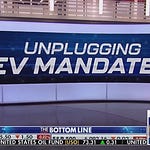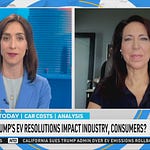Is Fuel Economy Being Illegally Regulated? Unpacking The Facts!
By Lauren Fix, The Car Coach
Could the rules behind your car’s fuel economy be hiding a big secret? Transportation Secretary Sean Duffy says Biden-era fuel economy standards were illegal, and he’s rolling them back. This move could lower car prices, and give you more options. But what does it mean for your wallet and your drive?
The Fuel Economy Showdown: What’s Happening?
The Trump administration is shaking up the Corporate Average Fuel Economy (CAFE) standards, which set miles-per-gallon (mpg) targets for automakers. In June 2025, Duffy announced that Biden’s rules, requiring an average of 50 mpg for light-duty vehicles by 2031, were illegal. Those standards, finalized in 2024, demanded 2% annual efficiency gains for cars starting in 2027 and light trucks from 2029, banking on a surge in EV sales. Duffy’s new interpretive rule, “Resetting the Corporate Average Fuel Economy Program,” doesn’t change standards yet but empowers the National Highway Traffic Safety Administration (NHTSA) to revise them soon. It argues Biden’s team violated federal law by factoring EVs into CAFE calculations, something banned under the Energy Policy and Conservation Act of 1975 and the Energy Independence and Security Act of 2007.
Adding fuel to the fire, Senate Republicans proposed scrapping fines for automakers missing CAFE targets with gas-powered vehicles, part of a June 2025 tax bill. These moves aim to ease burdens on carmakers and shift away from EV-heavy policies, but they’re sparking fierce arguments about cost, choice, and environmental impact.
Why Are the Rules Called Illegal?
At the heart of Duffy’s claim is how Biden’s CAFE standards were set. Federal law requires NHTSA to establish “maximum feasible” mpg goals for gas-powered vehicles, weighing technology, cost, and energy savings. But it explicitly prohibits counting EVs—classified as “dedicated alternative fuel vehicles”—in these calculations. Biden’s rules, Duffy argues, assumed massive EV growth, inflating fleet efficiency targets and effectively mandating more EVs. This raised costs for automakers, who had to invest heavily in electric models or face hefty fines.
Supported by the Alliance for Automotive Innovation, Duffy says this approach broke statutory limits, making the standards unlawful. Major automakers like GM, Ford, and Stellantis agree, arguing Biden’s targets were unrealistic and forced them to prioritize EVs over popular gas-powered SUVs and trucks. The Trump administration claims resetting CAFE will cut manufacturing costs, make cars more affordable, and let you choose what you drive, whether it’s gas, hybrid, or electric.
Inside Biden’s Ambitious Plan
To grasp the rollback, consider what Biden’s rules demanded. Set in June 2024, they aimed for 50.4 mpg for light-duty vehicles by 2031, saving 64 billion gallons of gas and cutting 659 million metric tons of emissions by 2050. Heavy-duty pickups and vans faced tougher goals, with 10% yearly efficiency jumps from 2030 to 2032. These standards were part of a push to halve vehicle emissions by 2032, with EVs expected to dominate new car sales.
Biden’s team argued the rules would save drivers about $600 per vehicle in fuel costs over its lifetime, reduce dependence on foreign oil, and fight climate change. Environmental groups like the Environmental Defense Fund cheered, citing cleaner air and energy security. But automakers weren't convinced, citing sky-high compliance costs and a market where EVs, despite heavy investment, remain pricier and less popular than gas vehicles. A credit-trading system let EV makers like Tesla sell excess credits to others, earning billions but adding costs for traditional carmakers, who called it unfair. Duffy’s rule challenges this system, aiming for a fairer market.
How This Affects You
This isn’t just a policy debate—it impacts your next car purchase. Duffy says scrapping Biden’s rules will lower production costs, letting automakers offer cheaper vehicles, especially affordable models for families and small businesses. High CAFE standards drove up prices by requiring costly tech like turbochargers or hybrids. The Alliance for Automotive Innovation suggests this could revive entry-level cars. However, less efficient vehicles could mean bigger fuel bills, potentially wiping out savings.
The rollback could also expand your choices. Strict standards pushed carmakers toward EVs, sidelining gas-powered SUVs and trucks that lead U.S. sales. Looser rules might bring more variety, including heavier, safer designs, as data shows these fare better in crashes. But environmentalists like Katherine Garcia of the Sierra Club warn this could limit clean-vehicle options, frustrating eco-conscious buyers. Older, less efficient cars—more common if prices drop—may also pose safety risks, creating a complex trade-off.
Biden’s rules promised major cuts, but reversing them could stall progress. In coal-heavy regions like the Midwest, EVs aren’t always cleaner than efficient gas vehicles. Curious? The EPA’s Beyond Tailpipe Emissions Calculator shows how your local grid affects EV emissions—it’s worth a look.
The Broader Clash: Policy Meets Politics
This fight goes beyond mpg—it’s a battle of priorities. Biden used CAFE to speed up EV adoption, tying it to climate goals and the Inflation Reduction Act’s EV subsidies. Trump, backed by automakers and oil interests, sees it as government overreach. His January 2025 executive orders, “Unleashing American Energy” and “Initial Rescissions of Harmful Executive Orders,” directed agencies to ditch EV mandates and boost fossil fuels.
The timing adds intrigue. Duffy’s rule landed amid a public clash between Trump and Tesla CEO Elon Musk, with Trump suggesting Musk opposed a budget bill cutting EV tax credits. Musk pushed back, but it highlights tensions as EV policies unravel. The EPA, now led by Lee Zeldin, is also rethinking emissions rules and California’s 2035 gas-car ban, signaling a wider retreat from green policies.
Environmentalists are alarmed. Garcia warns weaker standards will raise fuel costs, increase pollution, and harm health. Automakers, however, see relief after struggling with EV investments and sluggish sales. Stellantis, for instance, delayed its electric Ram pickup and doubled down on gas models post-election, reflecting the industry’s shift.
What Comes Next?
Duffy’s rule is a starting point. NHTSA will soon propose new standards, likely easing mpg targets and excluding EVs. Senate plans to eliminate fines could further relax enforcement, giving carmakers room to breathe. But legal battles are brewing—environmental groups may sue, arguing NHTSA must set “maximum feasible” standards. California’s tougher rules could also trigger a federal-state clash.
For now, the rollback aligns with Trump’s promise of affordability and choice. Whether it delivers cheaper cars or dirtier air depends on NHTSA’s next steps and consumer response. Fuel economy standards, born during the 1970s oil crisis, remain a flashpoint for energy, economics, and the environment.
Why You Should Care
This story hits your driveway, your budget, and the world you live in. Biden’s CAFE rules aimed high but, per Duffy, broke the law by banking on EVs. The Trump rollback could make cars cheaper and give you more options, but it risks higher fuel costs and emissions.
Stay tuned for NHTSA’s next moves and tell policymakers what matters to you. Whether you love gas, lean electric, or ride hybrid, you deserve rules that balance cost, choice, and a cleaner future. I’m Lauren Fix, your Car Coach, here to keep you in the driver’s seat.
You can support me by buying me a cup of coffee. Thanks for subscribing and your support! https://www.buymeacoffee.com/laurenfix
Looking for more automotive news? https://www.CarCoachReports.com
Total Car Score Podcast ► https://www.revolverpodcasts.com/shows/total-car-score/
Lauren Fix is an automotive expert and journalist covering industry trends, policy changes, and their impact on drivers nationwide. Follow her on X @LaurenFix for the latest car news and insights.















Share this post